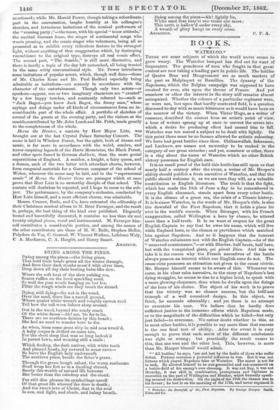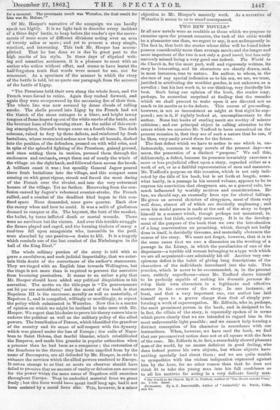BOOKS.
. WATERLOO.*
THERE are some subjects of which the world never seems to grow weary. The Waterloo banquet has died out for want of frequenters. The grandsons of men who fought in that great contest are now taking a leading part in public life. The battles of Quatre Bras and Hougoumont are as much matters of the past as Malplaquet or Ramillies. Tha dynasty of the Napoleons, which the Belgian campaign was supposed to have crushed for ever, sits upon the throne of France. And yet somehow or other the interest in tha story still remains almost unimpaired. Whether the colours of a particular regiment were, or were not, lost upoc that hardly contested field, is a question discussed to-day with as much bitterness as it would have been on the morrow of the victory. When Victor Hugo, as a writer of' romance, described the contest from an artist's point of view, a host of writers sprang up at once to correct the errors into which a desire for producing effect had caused him to fall. Waterloo was too sacred a subject to be dealt with lightly. Oct this point there must be no licence allowed for artistic colouring. We have had-great battles since then. Chilianwallah, Inkerman, and Lucknow, are names not unworthy to be ranked in the category of our great victories ; and yet, somehow or other, there is a ring about the name of Waterloo which no other British victory possesses for English ears.
It is no small proof of the hold this battle has still upon us that nearly half a century after the event, a writer of Mr. Hooper's ability should publish a fresh narrative of Waterloo, and that the public should welcome it, as we are sure they will, as a valuable contribution to English literature. The truth is that the fight, which has made the 19th of June a day to be remembered in every English almanack, stands apart from every other battle. It is the climax of a great era, the crisis of a Titanic history. It is because Waterloo, in the words of Mr. Hooper's title, is also, the downfall of the First Napoleon, that it holds a place for ever in the world's records. When Beranger, with his French exaggeration, called Wellington a hero by chance, he uttered more than a half-truth. It is no want of respect for the great English Captain to say that be owes his name, which will live while England lasts, to the chance or providence which matched him against Napoleon. And so it happens that the interest of Waterloo culminates not with the English Captain,—he of the "unmoved countenance,"—or with Blucher, half brute, half hero, but with the vanquished giant, qui Omit Dieu. And this we take it is the reason why the French narratives of the battle always possess an interest which our English ones do not. The causa victa possesses an attraction not given to the causa suit viz. Mr. Hooper himself seems to be aware of this. Whenever we come, in his clear calm narrative, to the story of Napoleon's last dying struggles, he seems to rise to a higher level, to speak with a more glowing eloquence, than when he dwells upon the doings of the hero of his choice. The object of his work is to prove that the victory was no chance success, but the brilliant triumph of a well conceived design. In this object, we think, he succeeds admirably ; and yet there is no attempt to overstate his case. We believe that he hardly does sufficient justice to the immense efforts which Napoleon made, or to the magnitude of the difficulties which he failed—but only just failed—to overcome. We rather doubt whether in this, as in -most other battles, it is possible to say more than that success is the one final test of ability. After the event it is easy enough to prove that each move of the different combatants was right or wrong; but practically the result comes to this, that one won and the other lost. This, however, is more than Mr. Hooper himself would admit.
", All battles,' he says, 'are not lost by the faults of those who suffer defeat, Fortune exercises a powerful influence in war. But it was not fortune which played Napoleon false at Waterloo. The secret is not far to seek. He allowed himself to be out-generalled and out-numbered on a battle-field of his enemy's own choosing. It was not hey, it was not Grouchy, it was skill in combination, promptness and vigilance in execution on the part of Wellington and Blucher, which humanly speak- ing secured his destruction. On the night of tho Itith the chases was in his favour; he lost it on the morning of the 17th, and never regained it
• waterloo: the Botettliat of the, Pint Xepotem. By George llooper. Smith, Elder,amiCo. for a moment. The proximate result was Waterloo, the final result for him was St. Helena. '
Of Mr. Hooper's narrative of the campaign we can hardly speak too highly. It is no light task to describe every incident of a three days' battle, to heap before the reader's eye the move- ments of some score of different divisions acting over an area of twenty miles or more ; and yet to present a story simple, succinct, and interesting. This task Mr. Hooper has accom- plished. That he has done so is due 'in great part to the high merits of his style. In these days of slipshod writ- ing and sensation sentences, it is a pleasure to meet with an author who writes without effort, and seems to have learnt the half-forgotten truth that words were meant for use, not for ornament. As a specimen of the manner in which the story of the battle is told, let us quote one paragraph from the account of the battle of Ligny.
"The Prussians held their own along the whole front, and the French were forced to retire. Again they rushed forward, and again they were overpowered by the unceasing fire of their foes. The whole line was now covered by dense clouds of rolling smoke. The shells poured into Ligny by the French had set the thatch of the stone cottages in a blaze, and bright tawny tongues of flame leaped up out of the white smoke of the battle, and the browner hues of the burning straw. In the midst of this excit- ing atmosphere, Gerard's troops came on a fourth time. The dark columns, raised to fury by three defeats, and reinforced by fresh battalions, whose restrained ardour now broke all bounds, dashed into the position of the defenders, pressed on with wild cries, and in spite of the splendid fighting of the Prussians, gained ground, and once setting them in motion, pursued them through the enclosures and orchards, swept them out of nearly the whole of the village on the right bank, and followed them across the brook. A brilliant onset it was ; but speedily General Jagow poured three fresh battalions into the village, and this compact mass coming on with greatvigour, struck and forced the most daring of the French over the rivulet, and into the very ontermoet houses of the village. Yet no further. Recovering from the con- fusion calmed by Jagow's vehement counter-stroke, the French rallied, and a combat of the deadliest kind began in this con- fined space. None demanded, none gave quarter. Each slew the enemy when and how he could. It was a milde of gladiators doomed to conquer or die. The bayonet, the butt of the musket, the bullet, by turns inflicted death or mortal wounds. There were no survivors but the victors. And over this terrible struggle the flames played and raged, and the burning timbers of many a roof-tree fell upon antagonists who, insensible to the peril, were absorbed by one passion—a desire to kill. It is a tragedy which reminds one of the last combat of the Niebelungen in the hall of the King Etzel."
The whole military portion of the story is told with so grave a carefulness, and such judicial impartiality, that we enter- tain little doubt of the correctness of the author's statements. They are tinged with an English bias towards Wellington, but the tinge is not more than is required to prevent the narrative from becoming passionless. It seems to us rather a pity that Mr. Hooper should have added any political disquisition to his narration. The motto on the title.page is "tin gouvernement eat lid par ses antecedents," and the moral of the book is that Napoleon III. is the successor, morally as well as materially, of Napoleon L, and is compelled, willingly or unwillingly, to repeat the policy which culminated in Waterloo. Now this is a matter of opinion on which we might be inclined to take issue with Mr. Hooper. We regret that his desire to prove his theory causes him to endorse the political as well as the military policy of the allied powers. The humiliation of France, which identified the grandeur of the country and its sense of self-respect with the dynasty which was placed under the ban of Europe ; the exile of Napo- leon to Saint Helena, that fearful blunder, which rehabilitated the Emperor, and made him grander in popular estimation when a prisoner than he had been as a conqueror ; the restoration of the Bourbons to the throne they had been expelled from by the name of Buonaparte, are all defended by Mr. Hooper, in order to enhance the services which the allied powers rendered to Europe. It seems strange to us that so acute an observer should have failed to pemeive that no amount of vanity or delusion can account for the power which the mere name of Napoleon still exercises throughout Europe. That he embodied material force we grant freely ; but this force would have spent itself long ago, bad it not been assisted by a moral force also. This, however, is a minor objection to Mr. Hooper's masterly work. As a narrative of Waterloo it seems to us to stand unsurpassed.































 Previous page
Previous page